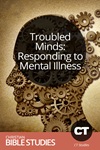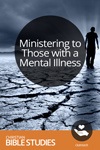My mother has schizophrenia. Her illness had a profound effect on our family, especially when I was a young teenager. Like many other families, we stayed pretty quiet about what we were experiencing. My dad was a pastor for 10 years, and after that we were involved laypeople—but many people didn't know what was happening, and the church leaders who probably wanted to help us didn't know how. No one ever talked about mental illness at church.
In my own pursuit of healing, I worked to understand my mom's illness and how it affected me. I started learning about how common mental illness is. I read about other people's experiences and realized how similar they were to our own. I grew to understand that the church's lack of engagement was affecting many more people than just my family.
What holds us back?
We have many historically based misconceptions about mental illness in our culture. Most people don't know enough about it to feel confident discussing it. Even now, brain science is still an emerging frontier. The causes and remedies for mental illnesses are not always known, so the sense of mystery around them—a sense that is partly outdated and partly legitimate—intimidates many people.
Many also feel intimidated because they don't have the professional education and qualifications to feel confident in helping. Most of us aren't medically qualified to help someone with a broken leg or cancer, either—yet we know we can offer our support. There's something about mental illness, however, that often keeps us from offering that same kind of help.
That “something” is stigma. In both our culture at large and in the church, we respond differently to mental illness than we do to other afflictions. We tend to marginalize people with mental illness, to write them off as incapable of contributing to our communities—and we fear them. This stigma is reinforced in popular culture: our ongoing silence on mental illness and also the way we speak about it when it does come up. While this pattern is starting to change very slowly, we have a long way to go—and I believe the church should be leading the way in rejecting stigma and irrational fears regarding mental illness.
Learn how to help—mentally and spiritually
In the church, mental illness tends to raise difficult spiritual questions that we don't always know how to answer: How accountable are people for their behavior when they have symptoms of mental illness? Does demon possession cause mental illness? Why does God allow the kind of suffering that can cause despair, delusions, and overwhelming anxiety? Why isn't following Jesus enough to heal mental illness?
In my book Troubled Minds, I addressed this question and fell back on the sensible advice of Dr. Archibald Hart, Professor of Psychology at Fuller Theological Seminary: "Unless you are trained in psychopathology…the most responsible action you can take is to refer the troubled person to a psychologist or psychiatrist for diagnosis." In many cases, a person may have both mental illness and spiritual issues to deal with. The best way to find out whether a mental illness is present is to refer the person to a mental-health professional. If the person has a treatable mental illness, that treatment can help clear the way for more effectively addressing spiritual issues.
But people who are receiving mental-health treatment have spiritual needs, too. And mental illness is often accompanied by spiritual crisis. It's critical to stick with those who are suffering from both, providing Christian care.
Avoid common misconceptions
A common misconception is that people with mental illness are inherently violent and dangerous. In general, people with mental illness are no more prone to violence than the general population—many, however, are vulnerable to violence and far more likely to be victims of crime than to commit crimes themselves.
It's also common to believe that mental illness is rare and happening on the fringes of our society. In reality, each year in the United States, about 26 percent of adults experience a diagnosable mental illness. Millions of children and teenagers experience mental illnesses, as well.
There is also wide variety in the disorders that affect our brains, just as the disorders that affect the rest of our bodies. Most mental illnesses don't look like the sensationalized versions we see on TV and in the movies. Most look like our friends and neighbors and the people sitting in our churches on Sunday mornings, suffering from depression, anxiety disorders, or other common conditions.
Many people also mistakenly believe that people with mental illness are doomed to live wasted and unproductive lives—that they can't contribute to the life of the church. We have a sense of spiritual hopelessness about mental illness that we don't have about other treatable conditions, even when those conditions are very serious. But God has a purpose for everyone, and though mental illness may alter the course of a person's life, it doesn't mean that person's life is not valuable anymore.
Psalm 139 is a beautiful reminder of our value to God and his attention to the details of our lives. Verse 16 celebrates this reality: "Your eyes saw my unformed body; / all the days ordained for me were written in your book / before one of them came to be." God is not surprised by any of our suffering, and he wants to use all of us. His redemption is always at work, and he uses suffering to make us more like him and to qualify us for ministry to others. If the church gives up on people, then that is the church's doing: It's not God's policy.
Offer practical resources
If you know someone who is mentally ill, here are three reminders to keep in mind as you take care of them (and encourage them to take care of themselves, as well).
Don't try to do this on your own. Pray, be honest with God about your own suffering, and ask him to give you strength and wisdom. As with any illness or injury, you can't provide good long-term care for someone else if you're not strong and healthy.
Find other people to help you. This can be tricky because your family member or friend might not want you to talk with others about their illness. Find safe places, like support groups specifically created for loved ones of people with mental illness. Look for a local chapter of the National Alliance on Mental Illness (NAMI), and find out when their support groups meet. Look for a local church or Christian ministry that offers supportive groups. Try to find a Christian counselor who can help you make sense of your own suffering and support your health.
Face and seek answers to your theological questions and spiritual crisis. For many people, mental illness just doesn't fit what we thought the Christian life should be. And because we don't often hear it addressed in churches, we may feel God doesn't have answers to our questions. But he does—and you're not the first person to ask them. Ask God to help you understand his truth in your situation, and seek counsel from a spiritual leader who has expertise in this area. Your own spiritual health and strength can give you confidence in walking through mental illness alongside someone you love.
Amy Simpson is the author of Troubled Minds: Mental Illness and the Church's Mission (InterVarsity Press). You can find her at AmySimpsonOnline.com and on Twitter @aresimpson. This article is adapted from an interview by Daniel Darling that first appeared on LeadershipJournal.com.










